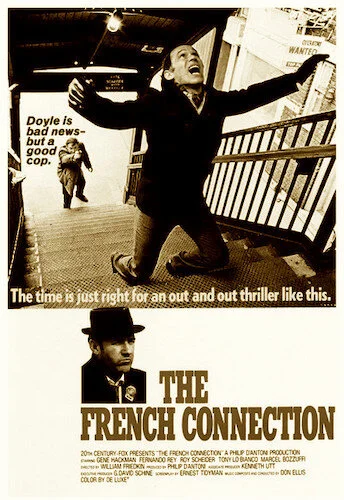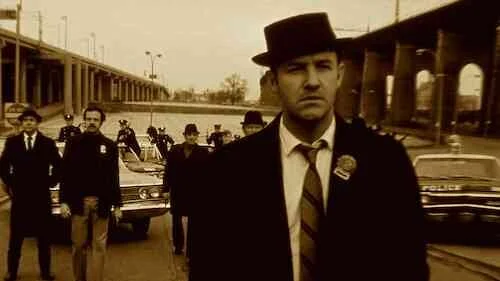The French Connection
This review is a part of the Best Picture Project: a review of every single Academy Award winner for the Best Picture category. The French Connection is the forty forth Best Picture winner at the 1971 Academy Awards.
By now, the capabilities of less conventional mainstream films was starting to truly impact the actual ways of mainstream cinema. William Friedkin permanently changed horror films with The Exorcist, but his earlier work The French Connection was also important in shifting blockbuster sequences, particularly with its iconic car chase sequence. So, this scene has to be a great deal, right? It has to be amazing. It’s the major talking point of the film now, decades later. Well, I have to be honest. My first trip with Popeye Doyle in this glamorous crime thriller felt like the pulling of teeth. I didn’t get it. Doyle was an unlikeable gorilla. The car chase felt janky. The film ends on easily one of the most abrupt conclusions of any popular film ever. I had zero connection with The French Connection.
A few years ago, I decided to try it again. Something must have been wrong. Well, part of the problem was my then-lack of knowledge about the New Hollywood movement. I wasn’t into superficial action flicks by any means (that may have been an excuse as to why I was not blown away by the car chase), but I still felt so removed from this place cinephiles were dipping their feet into. With a bit of a deeper dive into cinematic history, and a pinch of maturation on my part, and The French Connection began to make more sense. We’re not supposed to think Popeye Doyle is a perfect person; that’s half the reason why this mission means so much to him (his job is on the line, for obvious, clear reasons). The ending was meant to be abrupt: you hold your breath because of your lack of observation, and having the bad news delivered via cold title cards is the ultimate burn (and it matches the feel of the scenario).
The French Connection pivots entirely around Popeye Doyle’s wellbeing as a brutish detective.
As for that car chase, context is everything. I see it less as a “car chase” (the kind ‘90s kids may be used to), and more like a mosaic of filmed footage: a work of art being reassembled to tell a coherent story, and create complete unhinged chaos at the same time. It’s influential, because it told an entire story through the simple act of a cat-and-mouse event via vehicles. It still stands out, because its as jarring as the entire film itself is (and The French Connection also sticks out amongst its New Hollywood peers). It’s ugly, because making the chase pretty would have lost all of its impact. None of this case is flashy. It’s all grit-and-grind, and having such a choppy sequence exemplifies this case in a nutshell.
I understand the hype for this film, because I understand the film better. What I’m trying to wrap my head around now is how such a film ever won Best Picture in the first place. If Midnight Cowboy was out there, The French Connection was on another planet. It runs like a portfolio of editing and narrative experiments that all make their own statement, yet they also connect seamlessly (in some miraculous way). Being stuck behind detective Popeye Doyle just makes the entire exercise make more sense. He’s problematic, he’s short tempered, and highly detestable, yet this mission is important in the war on drugs, so we grin and bear it to stand beside him. That’s part of the appeal: we don’t necessarily care what happens to Doyle (thanks to a purposefully unpleasant performance by Gene Hackman), but we want to see what happens overall.
The car chase sequence remains one of cinema’s best; all things considered.
Sure, more people now may be more familiar with Friedkin’s Exorcist flick (which is also an incredible film), but The French Connection is a very close runner up in his filmography. While a bit rough-around-the-edges, and a stark contrast from what we may be used to today, its artistry shouldn’t be dismissed (don’t follow younger me’s lead). As a crime thriller, it focuses on every detail of a case (from its limited, realistic perspective). It also fixates on all of the dirt that comes with these kinds of missions, and the corruption of those with power on either side. The French Connection is Friedkin’s way of trying to channel French New Wave films in the New Hollywood format. It’s his understanding that evil is everywhere, and art is just as universal. The French Connection was a bridge between styles, a unified toxicity, and the bridge to the more daring works casual movie goers needed to have.
Andreas Babiolakis has a Masters degree in Film and Photography Preservation and Collections management from Ryerson University, as well as a Bachelors degree in Cinema Studies from York University. His favourite times of year are the Criterion Collection flash sales and the annual Toronto International Film Festival.







